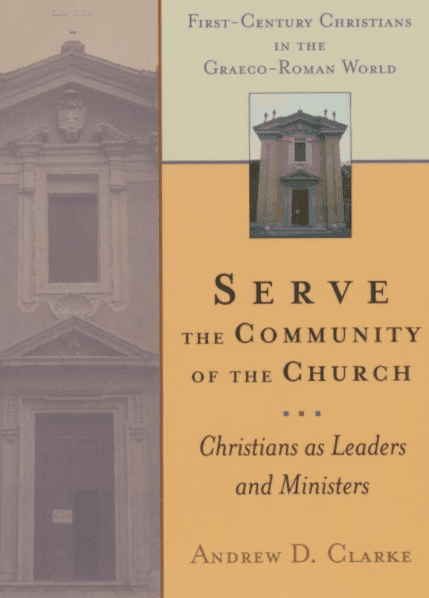I’m no specialist on leadership but today I want to speak of the Bible’s tension with how many establish principles of leadership today. What are the origins of our understanding of leadership?
I begin with this: We must shelve as a period piece (and wishful thinking) the view that the early church was radically egalitarian and democratic and utopian and, instead, was only led by the Spirit through spiritual gifts but that, unfortunately, later — The Pastoral Epistles — became institutionalized, hierarchical, and catholic. That is, that there were no recognizable or recognized leaders until the original inspiration was dying out.
This view surfaces to this day among critics of pastoral leadership, so-called institutionalization, and pastors in general, but has been nuanced to a different shelf by the best New Testament scholarship. The duration of radical democracies are measured in weeks and months, not years and decades. Eventually a leader surfaces.
A couple nuances: (1) This is not to say there wasn’t some development about who was a leader and what qualifications one needed to be a leader in the first few decades of the church. (2) We often get in the way of the New Testament when we examine terms like “overseers/bishops” and “elders” and “pastors” by imposing on the New Testament what is characteristic of our day. Leaders were present; the specifics are not as clear. (3) Take this from what who sees it: many of those who are anti-authoritarian are authoritarian about anti-authoritarianism.
Even if one concludes the 2d Century church modified the 1st Century church, the letters of Ignatius – by all accounts – manifest significant leadership of a bishop, of elders, and of deacons. When Ignatius exhorts the Ephesians to regard the bishop as one regards the Lord – well, there’s no whiff of egalitarian democracy in his viewpoint. It is reasonable, however, not to jump to radical conclusions but to think that the 2d Century develops organically what is already at work in the 1st Century. The leadership categories of someone like Ignatius are not creation de novo. This stuff doesn’t begin with Constantine, even if Constantine created conditions that established larger churches and larger leaders and larger authorities and larger powers and larger problems. He only took what was at hand and baptized it into Constantinian ways.
Leaders of weight were there from the beginning – starting with the Twelve and visible without question in the apostle Paul. A good case has been made that the fundamental term Paul used was hoi pro-istamenoi, that is, “those who lead” or “who are prominent” or “who stand in front.” It is noticeable, too, that Paul avoids many common terms for leaders in the Roman empire. Why? The argument that is most compelling is that Paul’s terms for leaders were shaped by Pauline needs for Pauline communities, and Pauline churches were house churches. Which terms Paul would use in larger churches and later church contexts, not least when Christianity was combined with empire under Constantine, would no doubt vary from house-church constraints.
 Leadership, however, was there from the beginning. Thus, Philippians 1:1-2 and 1 Timothy and Titus 1. We see in James and we see in 2-3 John. Perhaps the “angels” of Rev 2-3 stand behind or above the bishops or elders.
Leadership, however, was there from the beginning. Thus, Philippians 1:1-2 and 1 Timothy and Titus 1. We see in James and we see in 2-3 John. Perhaps the “angels” of Rev 2-3 stand behind or above the bishops or elders.
Depending on getting your definition of hierarchy well in hand — structuring of legitimate lines of accountability — there was hierarchy from the beginning, too.
If you want to read some good studies of this, start with Andrew D. Clarke’s books: he’s got three good ones, but I’ll mention just one: Serve the Community of the Church.
So what is a good pastoral leader? A leader is a pastor who, on the basis either of giftedness (charismatic authority), position/office (institutional authority) and example, creates and guides a congregation into a Christlike culture, seeking wisdom from appropriate sources, and motivating congregants by vision and teaching to participate in a Christ culture. That’s what “leader” at its core means, even if this emphasizes the leader’s role.
Now a problem: In many church cultures, leadership tends to find its substance in business models and in literature on leadership. The word “leader” is used for any number of pastors deemed by many as successful, whom other pastors gather around for wisdom on how to achieve the same.
To a few responses: First, I have had a career-long beef with the term “leader,” even though it is present in the New Testament, but because my life has been one of teaching the Gospels. In the Gospels we are not leaders but followers so it seems wise to say we are not leaders but followers. Mark Allan Powell once wrote a fascinating book that every preacher/leader ought to read. It is called What Do They Hear? and one of his major conclusions has to do with how preachers and congregants hear the Gospels: preachers identify with Jesus because they see themselves standing there with the authority of the Word of God while congregants identify with the disciples and other characters in the scenes. Lurking somewhere below the surface is that pastors who see themselves more as leaders and not enough as fellow followers of Jesus might be more prone to this problem than others.
Second, without one sniff or whiff of criticizing leadership-pastors there has been a tendency in the last three decades for pastors and churches to take over business and management models and think that by changing the terms into Christian ones the whole kit n’ caboodle of business and management can be baptized into Christian ministry. They can’t, even if the baptism breeds some kind of success. Management theories, business models, and leadership models have changed the face of the pastorate. One need only compare the two old pastors in Marilynne Robinson’s novels – Gilead, Home, Lila – with what passes now as ministry to see that something has gone wrong.
Here’s something for us all to consider: at the heart of Paul’s problems with the house churches of Corinth was that the Corinthians both were leading as their Roman empire world taught them and expected the same of Paul.
The Roman empire’s leaders — we’re talking here of secular, municipal, and provincial leaders like duoviri, aediles, and decuriones — were driven by (1) honor and public reputation, (2) propped up by wealth, (3) established by public benefactions and donations, and (4) fought back by serious invectives against threats to honor and reputation.
The Corinthians grew up in that world of leadership, embodied it the minute they became leaders in local house churches, and then opposed Paul because he was weird when it came to leadership.
Which is to say that Paul’s entire theory of leadership was revolutionary because he was cruciform in leadership, and it is not simplification to say that Paul’s theory of leadership can be found in his christology as expressed in Philippians 2:6-11.
My final point then is this: the attraction to secular models of leadership in the church today is Corinthian and that means we need once again to remind ourselves that our One True Leader, king Jesus, the Great Shepherd/Pastor, did not swing a sword of power but embodied a different way of life. That was what Paul was trying to communicate to the Corinthians — just read 1 Cor 1-4 or 2 Cor 1-8 with Cruciform vs. Corinthian leadership models in your head and you will — I’ll say it — “rise up and call me blessed!”












